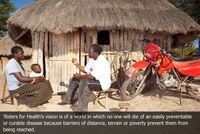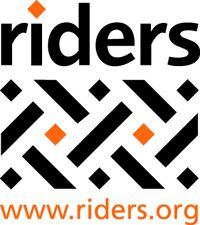People living in isolated villages in Southern Province, Zambia, will soon begin receiving more regular visits from health workers as Riders for Health launches its new program with the Zambian Ministry of Health. Today, January 20th, government officials and health partners will attend a ceremony in Livingstone to mark the launch of the program.
As well as allowing health workers to see more people, more regularly, the effective management of health vehicles will reduce costs and improve efficiency. This will allow the Ministry of Health to focus its resources on delivering health care, at a time when health budgets around the world are coming under increasing pressure.
**Dr Alisheke, Provincial Medical Officer for Southern Province **said, 'The need for well maintained vehicle fleets is no doubt the cornerstone of good health care delivery. A very large population of Southern Province is in the countryside, where road infrastructure is generally poor and the terrain is rough. It is my view that sustained health worker access to the remote rural populations requires the use of well maintained motorcycles and four-wheeled vehicles. I am confident that this plan will provide a greatly improved situation in the way that we are currently providing health services in remote areas.'
Riders for Health will train 76 health workers to ride safely and look after their motorcycles on a daily basis. The organization has also put in place a fully equipped workshop along with technicians who will carry out regular monthly services on each of these vehicles, preventing break down, ensuring a constant, reliable service.
This new program is also the focus of a groundbreaking study being carried out by the Stanford University Graduate School of Business to study the impact that reliable transport has on health systems in Africa. The team will evaluate the effectivenessof contracting out vehicle fleet management on strengthening health delivery and will examine to what extent Riders' work:
* improves vehicle fleet management,
* improves health worker productivity, _
_* increases equitable coverage of critical health interventions.
Like much of rural Africa, people living in Southern Province have great difficulties in accessing health care in this vast and diverse area. The new program will see Riders for Health managing 76 motorcycles and four four-wheeled vehicles across four districts of the province. The motorcycles will support the work of Environmental Health Technicians (EHT), who play a key role in the prevention of disease in rural communities.
As well as carrying out child immunizations and disease surveillance, EHTs provide health education to the community, safe water and sanitation programs, and inspections of food and premises. By preventing disease, EHTs allow health centres to focus their limited resources in a more efficient and effective way.
The vast majority of an EHT's work is outreach, conducted in the community. Without reliable transport EHTs are unable to visit the rural villages in their catchment area regularly. Yet, in Southern Province:
* 83% of the EHTs list problems of transport as the reason that they are unable to conduct outreach work.
* 75% of EHTs said that a lack of transport stops them conducting outreach work at least 50% of the time.
**Riders' chief executive officer, Andrea Coleman **said, 'This is an incredibly important program. Improving transport is a critical element of strengthening heath systems and improving global health. We believe that the work that Riders for Health is doing with our partners across Africa, and now in Southern Province, is an example of what can be achieved when transport is put at the heart of health care systems. The program shows our commitment to increasing the number of vehicles we manage, and health workers we mobilize, and we hope that the study being conducted by the Stanford Graduate School of Business will document and measure the impact our work has. But most importantly this program means that people in these four districts in Southern Zambia will begin to have much better access to the health care they need.'
The Stanford study is funded through a grant from the Bill & Melinda Gates Foundation. The four districts will be compared against four where Riders for Health will not be operating. Stanford University has been conducting a baseline study of all eight districts for five months. The results of the study are due to be published by the end of 2013.
Riders for Health began working in Zambia in 2009, starting in the country's Eastern Province. In Eastern Province Riders for Health is currently managing motorcycles for 10 outreach health workers from the Ministry of Health, as well as eight motorcycles used in Riders for Health's Sample Transport programme. Riders for Health employ specially-trained couriers to transport patient samples from clinics to laboratories and return with the results on a scheduled basis, allowing for quick and accurate diagnosis and timely treatment.
[Riders for Health
Riders is a not-for-profit non-governmental organization that specializes in the management of vehicles for health care and other public services in conditions in which there is no widespread network of vehicle-maintenance facilities. This is true of most of rural Africa and Riders therefore has programs in the Gambia, Lesotho, Zimbabwe, Nigeria, Kenya, Zambia and Tanzania.
Riders' programs are based on a groundbreaking financial model. The not-for profit business model approach employed by Riders involves charging clients for the use of vehicles on a cost-per-kilometer basis, ensuring governments can budget effectively and transparently. It also makes the system a corruption-proof solution for donors.
Riders is an internationally renowned social enterprise. In 2006 Riders was awarded the Skoll Foundation Award for Social Enterprise. Riders is a wholly-accountable body, whose work and not-for-profit status is subject to annual audit in every country in which it works and to the scrutiny of the Charity Commission in the United Kingdom and the Internal Revenue Service in the United States.












/cloudfront-us-east-1.images.arcpublishing.com/octane/TNOU5DNE2BC57MFPMGN2EIDXAM.jpg)
/cloudfront-us-east-1.images.arcpublishing.com/octane/GTCXACQGJ5HAPDTGWUQKDEH44E.jpg)
/cloudfront-us-east-1.images.arcpublishing.com/octane/S35YGSEMEZB4BLTDJTSZPF4GLA.jpg)
/cloudfront-us-east-1.images.arcpublishing.com/octane/5UOT6HPX2JFMRJAX6EH45AR4MQ.jpg)
/cloudfront-us-east-1.images.arcpublishing.com/octane/OKWOJWAKP5EP3OACCRRWPCIX2Q.jpg)
/cloudfront-us-east-1.images.arcpublishing.com/octane/2WF3SCE3NFBQXLDNJM7KMXA45E.jpg)
/cloudfront-us-east-1.images.arcpublishing.com/octane/G4MG6OUCJNBSHIS2MVVOTPX65E.jpg)
/cloudfront-us-east-1.images.arcpublishing.com/octane/IIGGWFOTOJGB7DB6DGBXCCMTDY.jpg)
/cloudfront-us-east-1.images.arcpublishing.com/octane/QSTCM6AVEZA5JJBUXNIQ3DSOF4.jpg)
/cloudfront-us-east-1.images.arcpublishing.com/octane/U4I7G625B5DMLF2DVIJDFZVV6M.jpg)
/cloudfront-us-east-1.images.arcpublishing.com/octane/B6XD6LS6IVCQPIU6HXDJSM3FHY.jpg)
/cloudfront-us-east-1.images.arcpublishing.com/octane/ICL63FEDDRDTTMINYICCEYGMDA.jpg)
/cloudfront-us-east-1.images.arcpublishing.com/octane/FCGZHQXRBZFLBAPC5SDIQLVF4I.jpg)
/cloudfront-us-east-1.images.arcpublishing.com/octane/WNOB6LDOIFFHJKPSVIWDYUGOPM.jpg)

/cloudfront-us-east-1.images.arcpublishing.com/octane/X33NU3E525ECRHXLNUJN2FTRKI.jpg)
/cloudfront-us-east-1.images.arcpublishing.com/octane/6KKT5NNL2JAVBOXMZYS5ZO76YA.jpg)
/cloudfront-us-east-1.images.arcpublishing.com/octane/J5RKG5O455GMPGQRF2OG6LRT7A.jpg)
/cloudfront-us-east-1.images.arcpublishing.com/octane/GX2CIZKQVRH2TATDM26KFG2DAE.jpg)
/cloudfront-us-east-1.images.arcpublishing.com/octane/ZWIDYSAKQZHD5BHREMQILXJCGM.jpg)
/cloudfront-us-east-1.images.arcpublishing.com/octane/CYUHJZCTSJCH3MRAQEIKXK7SCQ.jpg)
/cloudfront-us-east-1.images.arcpublishing.com/octane/LKOFINY56FCXJCANJ5M7ZDQUBY.jpg)
/cloudfront-us-east-1.images.arcpublishing.com/octane/4NBPDACMWJH63JQYJVK3QRBDZI.jpg)
/cloudfront-us-east-1.images.arcpublishing.com/octane/KKHQHRR3FJGX7H2IPU6RALMWG4.jpg)